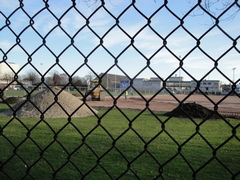The Astroturf in Baseball Stadiums Debate – The Principal Pros and Cons

In this feature on baseball scoreboards, I have researched into Astroturf (or artificial turf), which is a surface for sports arenas made from synthetic fibers, and looks just like natural grass. There has been a lot of debate about its use in baseball stadiums, so though I would add my two cents and summarize the main points surrounding the topic. So, in this baseball scoreboards feature, I have listed the main pros and cons of artificial turf:
Pros:
• Lower maintenance costs. Of course, the initial cost of installing Astroturf is quite high, but its upkeep is very cheap, which, in the long run makes it cheaper than the maintenance of natural grass.
• Suitable for all stadiums. It is difficult to grow natural grass on baseball stadiums that are covered or domed because of the scarcity of sunlight. Astroturf easily takes care of this problem.
• Pesticide-free. Pesticide and fertilizer treatment is not required for artificial turf unlike for natural grass.
• Increased playability. The durability of Astroturf is much higher than that of natural grass, so it is possible to use the same turf for longer periods of time and play at all times in all weather conditions.
• No irrigation or trimming. Unlike natural grass, artificial turf does not require any trimming or irrigation.
• Fewer injuries. Because it is more durable and smooth, fewer injuries occur on artificial turf than on natural grass. Since rough play and weather conditions can tear up natural grass, it can get a lot of slippery mud patches, which cause injuries.
• Saves water. Astroturf does not require any water, whereas a natural grass field requires 50,000 gallons a week when it is being grown.
Cons:
• Lead hazard. Astroturf fields are made from nylon fibers or a blend of nylon and polyethylene, which contain unsafe levels of lead. This is a potential health concern for the public. Lead exposure has been known to lead to stunted growth and mental retardation.
• Zinc hazard. The zinc levels that escape into the water (if it is raining) or into the air in general have been identified as hazardous. When humans are regularly exposed to zinc in these conditions, it has been found to possibly lead to cardiovascular damage.
• Other harmful components. The shredded rubber in Astroturf has other toxic components like cadmium, arsenic, and chromium.
• Heat hazard. An artificial field absorbs heat extremely quickly, which makes it difficult to play in hot weather. For example, if the air temperature is 98 degrees, the turf temperature could get as high as 120 degrees.
• Toxic run-off. After a heavy rainfall, the run-off that comes from an artificial field could pollute the drinking water of an entire community, since may contain infill material and lead.
• Bacterial breeding ground. Various medical studies discovered that bacteria such as staphylococci breed abundantly on polyethylene plastic, which is a component of the synthetic turf blades. The bacteria come from sweat, blood, and skin cells left behind after a game.
• Increased risk of MRSA. It is much easier to get open skin lesions when playing on artificial turf than on natural grass. These are even referred to as ‘turf burns’, and because of them, players are at a higher risk of MRSA.
• Adverse effects for asthmatics. Because of all the harmful components of Astroturf, asthmatics’ respiratory problems could be exacerbated by breathing them in.
• No turning back. Once an artificial turf has been installed, there is no option to grow natural grass ever again, because the plastic that replaces it will kill all living things on that soil, and nothing will be able to grow there again without a lengthy process of soil remediation.
For more information on Astroturf, go to:
//en.wikipedia.org/wiki/Artificial_turf


